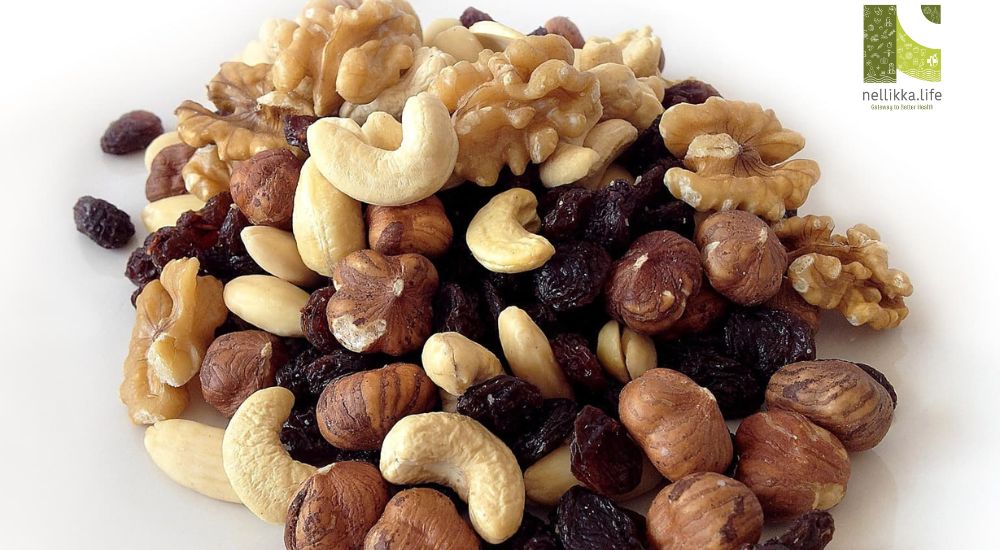When Healthy Snacks Go Overboard: The Truth About Overeating Dry Fruits

Dry fruits are often seen as a symbol of good health – rich in vitamins, minerals, healthy fats, antioxidants, and dietary fiber. Almonds, cashews, walnuts, pistachios, raisins, dates, and figs are common additions to health-conscious diets. While moderate consumption offers many benefits, overindulging in dry fruits can cause certain health issues due to their concentrated nutrient and calorie content.
1. Understanding Dry Fruits: Nutrient-Dense Foods
Dry fruits are either naturally dried (e.g., raisins, dates) or dehydrated to remove water content while retaining nutrients. This makes them energy-dense, meaning they pack a high number of calories in a small volume.
- Example: 100 grams of almonds provide ~580 kcal, with healthy fats and protein.
- Nutrient Highlights: Rich in vitamin E, magnesium, potassium, folate, omega-3 fatty acids (in walnuts), and antioxidants like polyphenols.
2. Health Benefits of Dry Fruits in Moderation
- Heart Health: Walnuts and almonds improve lipid profile and reduce LDL cholesterol.
- Blood Sugar Regulation: Pistachios and almonds can help lower post-meal blood sugar spikes.
- Brain Function: Omega-3s and antioxidants in walnuts support cognitive health.
- Digestive Health: Dates and figs provide natural fiber to improve bowel movements.
3. Risks of Overconsumption
While beneficial, excessive intake can backfire:
a. Weight Gain
Due to high-calorie density, overeating can cause a calorie surplus, leading to gradual weight gain.
b. Gastrointestinal Problems
Too much fiber from dates, figs, or raisins can cause bloating, gas, and diarrhea.
c. High Sugar Load
Naturally sweet dry fruits like dates, raisins, and figs have a high glycemic index; in excess, they can spike blood sugar, especially in people with diabetes or insulin resistance.
d. Mineral Imbalance
Cashews are rich in magnesium and phosphorus; excess intake may stress the kidneys in individuals with pre-existing kidney issues.
e. Allergy Risks
Nuts like cashews, almonds, and pistachios are common allergens and can trigger reactions in sensitive individuals.
f. Preservative Concerns
Commercially available dry fruits often contain sulphites to preserve color and freshness, which can trigger asthma or allergic reactions in some people.
4. Scientific Recommendations for Safe Intake
- Serving Size:
- Nuts: ~28g (a small handful) per day.
- Dried fruits: 20–30g (about 2–3 tablespoons) per day.
- Pair with Other Foods: Eating dry fruits along with fresh fruits or complex carbs slows sugar absorption.
- Hydration: Drink enough water to avoid constipation from high fiber intake.
- Choose Unsweetened & Unsalted: Avoid added sugar and salt in packaged varieties.
5. Who Should Be More Cautious
- People with Diabetes: Limit high-sugar dried fruits; opt for nuts or low-GI fruits like apricots.
- Those with Kidney Stones: Avoid excess almonds and cashews as they are high in oxalates.
- Overweight Individuals: Monitor portion sizes to avoid calorie overload.
Dry fruits are nutritional powerhouses and can be part of a healthy diet when consumed in moderation. However, more isn’t always better – overconsumption can lead to weight gain, digestive distress, and metabolic imbalances. The key lies in portion control, quality selection, and balancing them with other fresh, whole foods.
References :
1. Health Benefits of Nut Consumption
2. Nuts: Natural Pleiotropic Nutraceuticals
3. The glycemic effect of nut-enriched meals in healthy and diabetic subjects




